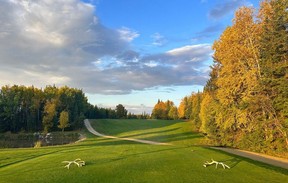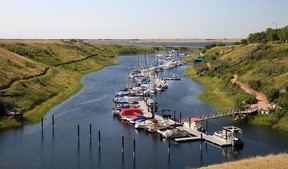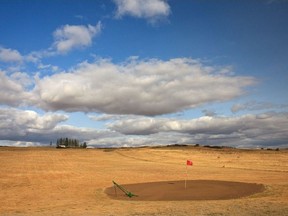Reviews and recommendations are unbiased and products are independently selected. Postmedia may earn an affiliate commission from purchases made through links on this page.
Article content
Somewhere south of Fox Valley the narrow, wheat-lined road twisted through a coulee and rose to a golden, wind-swept plot of prairie webbed with golf holes. Not a soul in sight. Yes! I hollered to a dazed and confused cow. A golf course! In the middle of nowhere. And I’ve got it all to myself! Indeed, take a road trip through Saskatchewan and you’re always in for a few surprises.
Advertisement 2
Article content
Whether it’s a buckled barn slowly sinking into sweetgrass, a lovely duck-specked lake wedged between rolling hills, or a small-town museum loaded with treasures from the past, Saskatchewan is a treat for anyone who likes to hit the highway with a go-wherever-the-road-takes-you agenda.
Of course, discovering a sweet little “sander” – a golf course with sand greens instead of grass – is not all that difficult in Saskatchewan. There are well over 100 of these rough-around-the-edges, farmer-style golf courses remaining in the province; the biggest such deposit of sand-green courses in the world.
For me, an avid golfer who has played all over the world, sand green courses, despite their ragged conditions (most of these rural courses simply don’t have the resources to maintain proper turf), are a unique and weirdly enjoyable experience. I mean, teeing off with a cow mooing in your backswing and hand-raking the green after you putt out is something you can’t do just anywhere. Sure it’s rough and rudimentary; all part of the fun.

Payment, which is usually around $5 for a round, is almost always by the honour system. Put your money in the box by the first tee and away you go. But please, if you value your life, do pay up. Case in point: near the first tee at the quirky (they all are) sand green course in Tompkins, a white cross sits atop a body-sized mound of dirt. On the cross is the simple inscription “Unpaid Golfer.” Don’t say I didn’t warn you. (FYI: For my hard-earned “fiver,” the best “sanders” in the province are found in the small villages of Hazlet and Kyle. Both feature beautiful prairie settings and super-fun holes.)
Article content
Advertisement 3
Article content
For those with more refined tastes, Saskatchewan also boasts numerous “grass” golf courses as well. Some that rival the best in the country. More on those later.
Because I’m based in Calgary, it’s really the western sections of Saskatchewan that I’ve explored the most. And wherever I am, it’s the vast spaces, the living skies, and the cool little surprises that I always remember.
In terms of where I like to roam, I’ve got many favourites. The Cypress Hills region (famous for the Cypress Hills Massacre of 1873), the Great Sand Hills near Leader (do some homework, they’re difficult to find), and the rolling farmland near Biggar and Rosetown (there are several cool ghost towns in this area) are three of my favourite areas to explore.

On my latest trip through Saskatchewan, after stumbling on the fantastic and remote sand green course near Fox Valley (it’s called Valley View Golf Club and, as of 2022, they were down to just four members), I worked my way further north, through Leader, Kindersely, and up to North Battleford, where I “discovered” the Western Development Museum.
Advertisement 4
Article content
The WDM, which is Saskatchewan’s largest human history museum, has four locations – North Battleford, Saskatoon, Moose Jaw, and Yorkton – and is an absolute treasure for anyone who appreciates Prairie history Highlights of the North Battleford museum include a 40-acre heritage town (one of the largest in North America), an iconic grain elevator, a restored steam engine, and more than 30 turn-of-the-century homes and businesses.
After exploring the museum in North Battleford, my golf addiction kicked into high gear and I made my way to Prince Albert National Park to visit a course I’ve had on my wish list for decades. Designed by the legendary architect Stanley Thompson and opened in 1935, the Waskesiu Golf Course is like a rare and priceless gem in Canadian golf. Needless to say, the course, which features 18 one-of-a-kind holes slotted through a ragged-and-rolling swath of Boreal forest, didn’t disappoint. Also, I can think of no better clubhouse in Western Canada to enjoy a refreshment after your round. The 90-year-old Tudor-style, timber-and-stone building is saturated with rustic charms, old photos and cool memorabilia. Indeed, Stanley’s Pub & Grill is probably my favourite “19th hole” in Canada.
Advertisement 5
Article content

If you want to add to your golf experience while visiting the park, the Elk Ridge Resort (it’s just 15 minutes away from Waskesiu GC) features 27 holes of modern golf that will exceed your expectations. In fall, especially, with nearly the entire parkland course parading through a majestic mixed forest, it’s as peaceful and pristine as golf gets in Saskatchewan.
For non-golfers, especially, another nice surprise in Prince Albert National Park was the quaint and picturesque townsite along Waskesiu Lake. This nice little resort town is home to an awesome little beach, wonderful walking and biking trails, and plenty of cool stores, shops, and restaurants. My favourites are Evergreen Coffee & Food (excellent espresso), Waskesiu Trading Company (get a cinnamon bun), and Restaurant Pietro (an outstanding Italian steakhouse that alone is worth travelling to Prince Albert National Park to experience).

On my way back to Calgary, I pulled into the tiny town of Elbow and experienced, perhaps, the best “surprise” on the trip. Hard on the shore of massive Lake Diefenbaker (it’s 225 km long), this lovely little town boasts one of the prettiest 18-hole lakeside golf courses in the Prairies. And I didn’t even know there was a course there.
After golf, I sipped a beer on the sunny patio at the clubhouse and watched sailboats bobbing in the bay and clouds drifting over the wind-rippled water. For a moment, I thought I was in some gorgeous little cove in the Maritimes. Which, given the fact that I was in the dead centre of Saskatchewan, was a little surprising. But that’s Saskatchewan for you.
Article content

